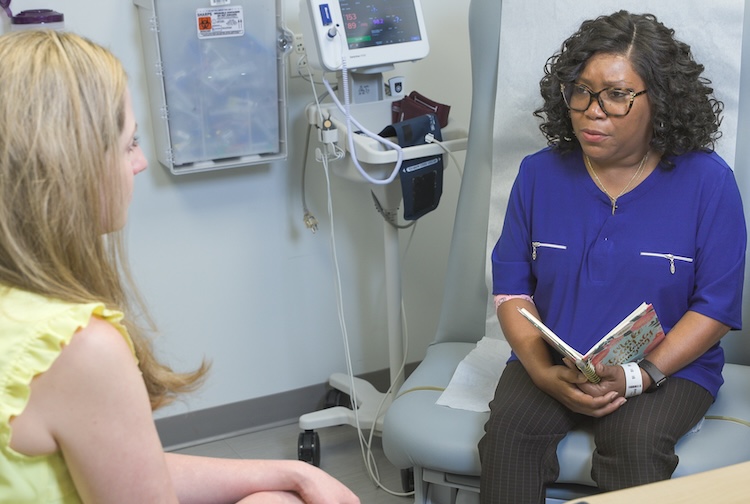Once coronavirus vaccine exists, researcher's mailable patch could deliver it to millions
May 14, 2020
As researchers worldwide work on potential vaccines, Guizhi “Julian” Zhu has pivoted to focus on how one could be delivered — without people even needing to leave home.
Someday, hundreds of millions of vaccinations against the coronavirus (COVID-19) could show up in people's mailboxes and be applied as simply as slapping on a Band-Aid. That's the vision of Guizhi “Julian” Zhu, Ph.D., at the VCU School of Pharmacy.
Zhu, an assistant professor in the school's Department of Pharmaceutics, is researching a way to use tiny needles embedded in a small patch to give vaccinations.
“People, no matter who they are, can apply the patch to their own arm,” Zhu said. “And that's it. People are vaccinated.”
Patch could possibly be used for future coronavirus vaccine
Laboratories and governments around the world are racing to find and test a vaccine to protect against the deadly coronavirus — a process that most experts say will take at least a year. But even when a vaccine is ready, another enormous hurdle will remain: delivering that vaccine to millions or even billions of people.
If successful, Zhu's design for a vaccine patch offers a number of advantages over standard vaccinations. For example, it would be relatively simple to send vaccines directly to people by using the mail system. Each vaccine patch is about the size of a little fingernail and would fit easily inside an envelope.
Another plus: Since the patches would be easy to apply, the method would reduce the need for people to travel to health care centers, many of which have been overburdened during the pandemic. This would help people most at risk for the disease, who are older and sicker than the general population, as well as to vital health care workers.
Vaccine patch has familiar look, different process
Zhu's design looks similar to nicotine patches used in smoking-cessation products. But it works very differently.
Nicotine patches allow chemicals to seep through the skin. But that is not a practical approach for vaccines. Instead, Zhu's design uses more than a hundred polymer microneedles — each as thin as a human hair — on each patch to get through the skin.
“It's not painful, not like a syringe,” Zhu added.
These microneedles would dispense harmless synthetic fragments of the virus embedded in a protective ball of nanoparticles that dissolves once it enters the body. The fragments, while doing no harm themselves, would teach the body's defense system to recognize and attack any real COVID-19 viruses that appear.
Vaccine patch one of first projects funded by VCU COVID-19 Rapid Research Funding Opportunity
Zhu's research, funded in part by the Department of Pharmaceutics and VCU's Center for Pharmaceutical Engineering and Sciences, was one of the first 20 proposals to receive grants from the VCU COVID-19 Rapid Research Funding Opportunity. Nearly 70 faculty members applied for the support, aimed at encouraging researchers across a broad range of subjects to quickly expand their work to address and diminish the impact of the COVID-19 pandemic on the health system and our community.
“This is the kind of impactful research the program is designed to support and the kind of inventive thinking that will help us successfully fight the novel coronavirus,” said P. Srirama Rao, Ph.D., VCU's vice president for research and innovation. "The microneedle patch could potentially change the delivery of other vaccines now typically administered in a medical setting."
Zhu also has experience in developing targeted drug delivery systems and cancer nanomedicines. He is an associate member of the Developmental Therapeutics research program at VCU Massey Cancer Center.
With support from the VCU School of Medicine lab of Aron Lichtman, Ph.D., Zhu is working on preclinical studies to be sure the patches will deliver predictable doses of vaccines embedded in the protective nanoparticles. He also will be testing to ensure the patches remain effective over extended times and in the varying temperatures they would encounter in mailboxes.
“It's our best hope that we can test to confirm this [design] within the next six months,” Zhu said. If the tests are successful, the next step would be to make plans to manufacture the patches when a vaccine is ready and prepare for clinical testing.
By Greg Weatherford, School of Pharmacy
goweatherfor@vcu.edu; (804) 828-6470




